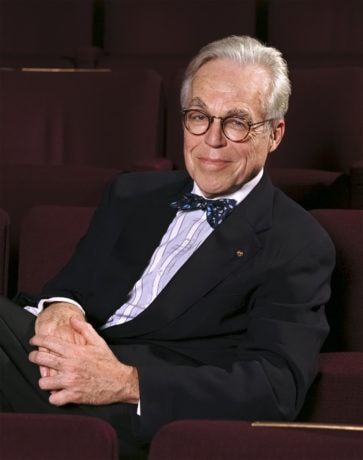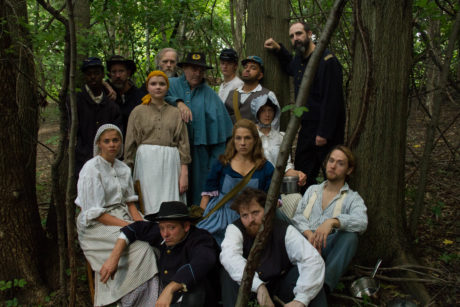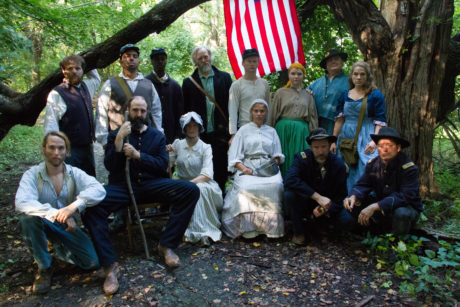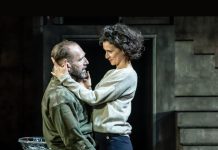With an illustrious career spanning the past five decades, John Guare has been the recipient of Tony, Obie, and Olivier Awards, a finalist for the Pulitzer Prize for Drama, and an Oscar nominee, among his many other honors. Highlights of his renowned work include The House of Blue Leaves, Six Degrees of Separation, Landscape of the Body, and A Free Man of Color, along with the screenplay for the film Atlantic City.

Born, raised, and based in New York City, the acclaimed playwright and alumnus of Yale University, who celebrates his 80th birthday on February 5, is gearing up for the world-premiere production of his entire Lydie Breeze Trilogy in Philadelphia this month through May, for the 25th-anniversary season of EgoPo Classic Theater. The three-part historical epic, which Guare began in 1980, and continued to develop over the next 30 years, traces the fictional story of the eponymous nurse and her family from the time of the Civil War and Nantucket whaling, through their foundation of a Utopian community on the island, to the dawn of the 20th century and the rise of American industrialism. Directing the production and its 24-person ensemble of actors/musicians is Guare’s longtime friend and colleague Lane Savadove, EgoPo’s Founding Artistic Director.
During an active week of rehearsals before the highly-anticipated opening of the first installment, Part I: Cold Harbor, on February 2, the delightfully affable Guare made time in his busy schedule for a lively conversation with me about the current production, and about his interests, background, and motivations as a playwright.
Deb: What made you decide on EgoPo and Philadelphia for the world premiere of the full Lydie Breeze Trilogy?
John: Lane Savadove! Lane has been a faithful supporter of the play since our days together at the New York Theatre Workshop, and then did a version of it in New Orleans, when his company was located there. He’s always wanted to do the work in its entirety, and now, thanks to a generous grant from the Pew [Center for Arts & Heritage] in 2016, he’s able to do it. You go where the people are that you want to work with, and who are interested in working with you. Lane is very enthusiastic, and Philadelphia is an interesting theater community, because even though it’s close to New York, it doesn’t really care about that; it’s in its own world and doing what it wants to do, completely apart from New York. I loved Lane’s production of The Seagull last year; it was one of the best I’ve ever seen. The characters had no idea how funny they were, and then the comedy of their ridiculous behavior turned tragic, just as Chekhov wrote it. Melanie Julian, who starred in that one, has the wit, gravity, and spirit that also make her perfect for the lead role of Lydie.
Have you been an active participant in the production process in Philadelphia?
I was there yesterday, and for the beginning of rehearsals. I was also in on all of the main auditions. It’s such a treat for me to be back in the world of this play! The EgoPo version was originally done with Natasha Richardson on BBC Radio. There are no major revisions or rewrites for this production, just some exigencies to take out those lines that were added specifically for the radio, which aren’t necessary for a theater audience.
I attended the Sir Peter Schaffer Memorial at the American Airlines Theatre in New York on April 3, and appreciated you recounting your conversation with him about the person he would most like to direct his work. Would you mind repeating that discussion for our readers, to give a playwright’s perspective on the ideal director?
It’s the spirit and the tone of the playwright that should be maintained, so we want to work with directors who are true to the content of our writing, not the ones who want to use our plays to work out their own ideas. Peter and I were friends at the Dramatists Guild, and that’s why it’s there – it exists to protect our control over the content of our work. The one thing that frightens me the most as a playwright is to hear from a director, “I have a concept in mind.”
What is EgoPo’s production bringing to your work that most impresses you?
First of all, it’s the commitment. The play is about a band of people who are thrown together in war, and the four actors in the principal roles with EgoPo have all worked together before and know each other so well that they have that quality of love and intimacy among them. They are all terrific. And so from my side, I want the play to be good for Lane and to warrant his passion for it. It’s funny – no matter how many plays you’ve done, every opening night is the first one, and you get nervous and want to hide and try not to throw up!

EgoPo is offering three ways to see the trilogy: in three installments over three months; on three consecutive nights; or in one nine-hour marathon, with breaks for meals. Which would you choose, and what are the benefits of each?
I’m not trying to be evasive, but I think it’s at your own convenience. You should see the play in the way that’s the most comfortable for you to do it. I like the idea of being immersed in the entire story, but not everyone is able to spend a full day at the theater, so whatever fits best with your schedule is the way you should see it.
What inspired you to write Lydie Breeze and to use the extended format of a trilogy to tell the story?
It was not originally intended as a trilogy, I was writing a play. I’m a New Yorker, and I worked in an urban world that was familiar to me; my plays tended to take place in a modern city. Then, in 1973, I escaped to Nantucket and it changed my life; I found my wife there. One day I saw the Polish actress Elżbieta Czyżewska, married to The New York Times journalist and Warsaw correspondent David Halberstam, talking to a twelve-year-old girl who had gotten a pass to her show. Elżbieta had left her country and come to America with Halberstam; she became an exile and an outcast, completely erased from Poland. I wondered what she was telling the girl, what they were talking about. Then I thought about my parents, who were born in the 1890s, and wondered what was happening in the world they were born into? So that’s the period in which I set Lydie Breeze. I wrote the third play in the trilogy first, then I wanted to develop the backstories of the characters, so the three parts were actually written in reverse. And I even wrote a fourth part. The question that interested me, and what I wondered, was what stories get passed down? What does one generation tell the next generation?
Do you find it more challenging to create a work of historical fiction than a contemporary piece? Does it involve a different creative process?
No, not at all; you just have to learn not to get drowned in the research. When I wrote The House of Blue Leaves, though it was a current work, I had to do research on the 1960s. Even if you write about New York in 2018, you’re still creating a new world, and even if the research doesn’t end up in the play, you have to give it to the actors so they can understand the context of the world you’re creating.
Is there a particular message or life lesson that you would like audiences to take away from Lydie Breeze – one that has been a consistent theme or moral throughout your work?
If I could do that, I wouldn’t need to write the play; I could just do a needlepoint with the motto and give it to people! I think everyone in the audience finds something different in the story. We all take what we need from art, whatever holds the most meaning for us individually in our lives.
What’s your first creative memory – the one that sticks with you from childhood or made you realize that a career as a playwright was the one for you?
I wrote three plays when I was eleven years old! We did them in the garage and the Long Island press came and did a feature on them. Then my parents gave me a typewriter for my twelfth birthday, so that’s always been it – Johnny’s a writer!
After the opening at EgoPo on February 2, do you have any new projects scheduled or in mind that we can look forward to in the near future?
Next year at this time we’ll be starting work on a new project, a new play. And I’m trying to finish another by the beginning of summer. I don’t want to say too much yet, until we’re ready to announce it. It’s that old superstition – it’s supposed to be bad luck to talk about upcoming work and maybe jinx it.
Well I definitely don’t want to jinx you! Thank you so much, John, for your time and comments. It was a pleasure to talk to you in anticipation of the Philadelphia premiere. I look forward to the show and to seeing you there!

The Lydie Breeze Trilogy plays January 31-May 6, 2018, at EgoPo Classic Theater, performing at Christ Church Neighborhood House – 20 North American Street, Philadelphia, PA. For tickets, call (267) 273-1414, or purchase them online.





